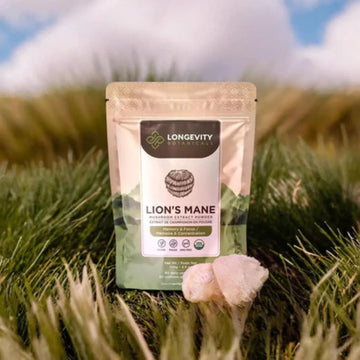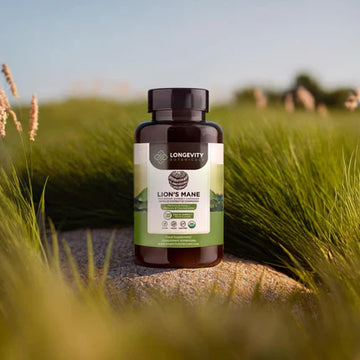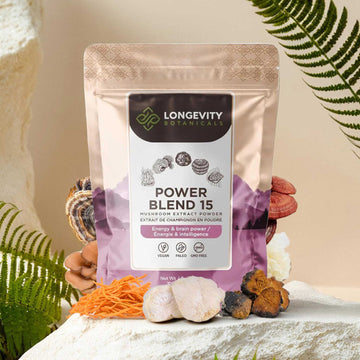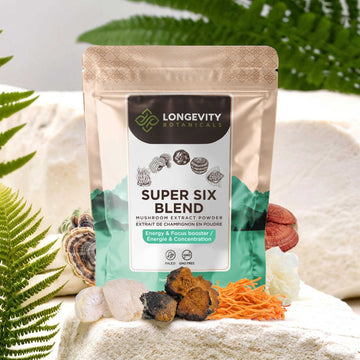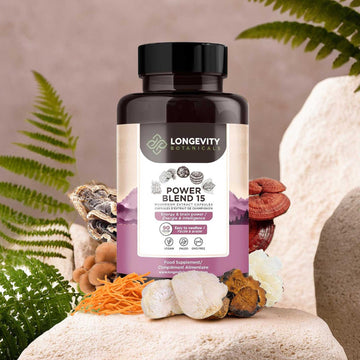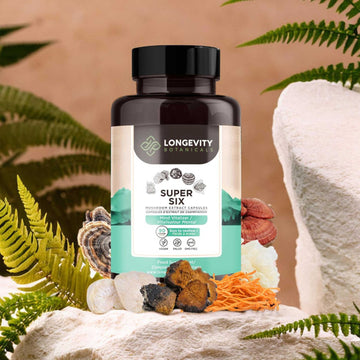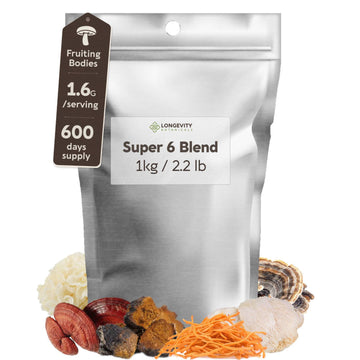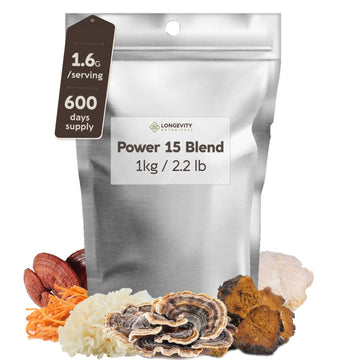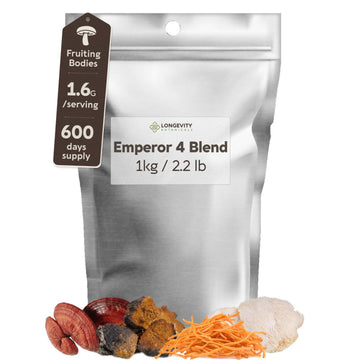Agarikon, Fomitopsis officinalis, is one of the oldest documented medicinal mushrooms in Eurasia and North America.
Traditional healers prized it for stubborn respiratory complaints, and modern labs are now isolating polysaccharides and triterpenes that appear to influence immune tone and viral replication.
What makes Agarikon unique
Ancient use, modern focus. Historical records linked Agarikon with respiratory health. Today, researchers evaluate extracts for activity against influenza and herpes viruses, and for immune signaling effects in cell and animal models. A 2018 review summarized broad antimicrobial and antiviral observations in vitro, including activity against influenza A and B, and herpes viruses, with favorable selectivity indices, which is a simple ratio of potency to cell safety that scientists use in early screening source.
Rich chemistry. Agarikon fruiting bodies contain beta glucans, triterpenoids, phenolics, and organic acids. These compounds are the likely drivers behind its immunomodulatory and antimicrobial profile, and recent surveys continue to catalogue this diversity source.
Antiviral support, what the science shows
In vitro screening against respiratory viruses. Laboratory studies compiled in the 2018 review above report that crude Agarikon extracts remained active even at high dilutions against influenza strains and herpes simplex, which suggests direct antiviral effects in a dish. These are not human trials, but they are a first step scientists use to identify promising candidates.
Why selectivity matters. Early antiviral screens report a selectivity index, a comparison of how strongly an extract inhibits a virus versus how it affects healthy cells. A higher number is better in these initial assays. Agarikon extracts have shown favorable selectivity in some screens, which is why the species continues to attract research attention source.
Context from fungal biology. Across medicinal mushrooms, beta glucans and related polysaccharides can indirectly limit viral burden by priming innate immune responses. Reviews on fungal beta glucans outline how these fibers engage receptors like Dectin-1 and complement pathways, which can enhance antiviral defense while helping the immune system respond in a measured way source.
Immunomodulation, the balance point
Signal, do not overstimulate. Immunomodulation means nudging immune cells toward balance, not simply turning them “up.” Polysaccharides from Agarikon have shown the ability to influence innate and adaptive arms of the immune system in preclinical models, including interactions with pattern recognition receptors and angiogenesis pathways that are relevant to immune surveillance source.
Why this matters day to day. In practice, balanced signaling is what you want for seasonal support. Overactivation can feel like jitters or inflammation, underactivation leaves you vulnerable. Polysaccharide-rich extracts are studied for helping immune cells recognize patterns on microbes more efficiently, which can translate into a quicker, more proportionate response.
How Agarikon may support you during the season
Respiratory wellness. Tradition points to lungs and upper airways. Modern mechanisms suggest two routes, direct antiviral effects observed in vitro, and indirect support through innate immune priming. Together, they form a reasonable biological basis for seasonal use.
Synergy with other mushrooms. Many users pair Agarikon with Turkey Tail or Reishi to combine immune priming with gut-immune crosstalk and relaxation at night. If you are exploring combinations, keep total daily beta glucans in a moderate range and introduce one change at a time to notice effects.
Choosing a quality Agarikon extract
Fruiting body first. The fruiting body is where beta glucans and triterpenes concentrate. Avoid products dominated by grain-grown mycelium, which dilutes active compounds with starch. For background on why this matters, see our explainer on fruiting body vs mycelium.
Evidence-based extraction. Water pulls out polysaccharides, and thoughtful “bio-enhanced” steps can improve yield and solubility. At Longevity Botanicals, Agarikon is extracted with a bio-enhanced hot water method to concentrate beta glucans for practical daily use.
Quantified beta glucans. Clear labeling of beta-D glucan percentage is a useful quality signal. Our Agarikon line specifies 30 percent beta-D glucans with a 10 to 1 extraction ratio, aligning the label with what you are actually taking.
Clean formats. If you prefer capsules, look for plant-based shells such as HPMC. If you prefer powders, check for a fine, readily dissolving extract that mixes well in warm water or broths.
How to use Agarikon
When to take it. For seasonal support, many practitioners suggest morning or early afternoon, since immune-active supplements can be energizing for some people. Consistency for several weeks is common for noticing benefits with beta glucans.
How to take it. Stir powder into warm tea or broth, or take capsules with a light meal. Start low, then titrate to label directions. For culinary routines or stack ideas, you can explore our Agarikon overview for additional context on pairing and usage tips Agarikon benefits.
Who should be cautious
Medical conditions. If you have an autoimmune condition, are on immunosuppressants, have a planned surgery, or are pregnant or nursing, speak with your clinician first. Mushrooms can modulate immune activity, and your care team should approve any new regimen.
Allergies and sensitivities. Discontinue and seek medical advice if you notice rash, shortness of breath, or digestive upset. Introduce one supplement at a time so you can identify the cause of any reaction.
Practical guide, product picks
Capsules for simplicity. If you want measured doses with minimal prep, consider agarikon capsules. Capsules are easy to travel with and help you stay consistent.
Powder for mixing. If you enjoy elixirs or soups, choose agarikon powder. Powders are versatile in warm drinks and broths, which fit the mushroom’s traditional use for respiratory comfort.
Browse the full range. You can view all options on our Agarikon supplements page.
Frequently asked questions
Is there human clinical data yet. Human trials focused exclusively on Agarikon for respiratory infections are still limited. Current evidence includes traditional use and preclinical studies showing antiviral activity in vitro and immune signaling in models. This is why product quality and steady use over time are important, and why you should keep expectations realistic while the clinical literature grows.
How fast will I notice effects. Beta glucans are not stimulants. People commonly report feeling more resilient over weeks, not days. Track your sleep, stress, and seasonal symptoms to notice subtle changes.
Can I take Agarikon year round. Many do, especially at lower maintenance servings, and then increase during demanding periods. If you have a condition that changes immune activity, coordinate with your clinician.
Bottom line
Agarikon sits at the intersection of tradition and emerging science.
Its polysaccharides and other compounds show antiviral activity in vitro and immunomodulatory effects in preclinical models, and quality controlled fruiting-body extracts offer a practical way to integrate this heritage fungus into a modern routine.
If you decide to try it, choose a quantified, fruiting-body extract, use it consistently, and fold it into a broader plan that includes sleep, nutrition, and stress management.
Selected references for further reading:
1. Review of Agarikon antimicrobial and antiviral findings, including influenza and herpes activity in vitro, with selectivity indices, open access on PubMed Central read here.
2. 2024 report on F. officinalis polysaccharides that interact with immune pathways, PubMed record read here.
3. 2025 overview of F. officinalis chemistry and pharmacology, Frontiers in Cellular and Infection Microbiology read here.
